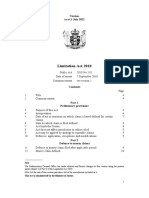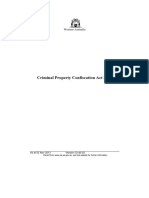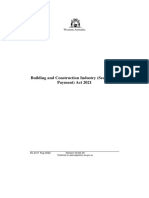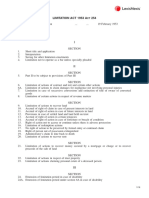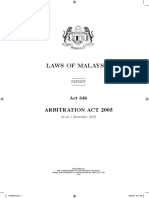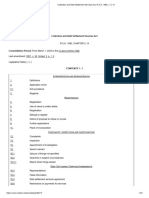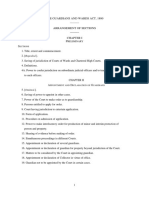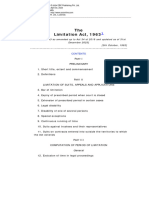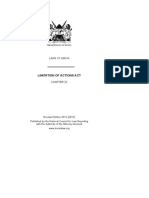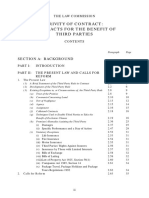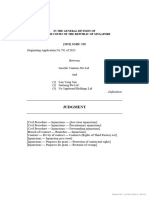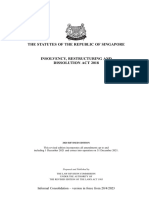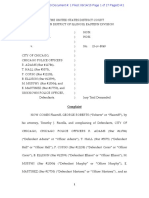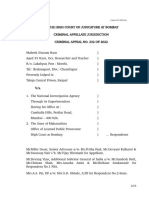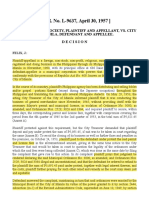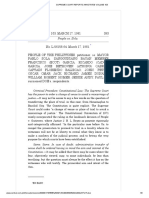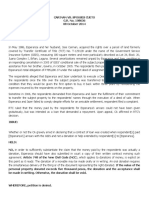Spent Convictions Act 1988
Spent Convictions Act 1988
Uploaded by
Jake AlexanderCopyright:
Available Formats
Spent Convictions Act 1988
Spent Convictions Act 1988
Uploaded by
Jake AlexanderCopyright
Available Formats
Share this document
Did you find this document useful?
Is this content inappropriate?
Copyright:
Available Formats
Spent Convictions Act 1988
Spent Convictions Act 1988
Uploaded by
Jake AlexanderCopyright:
Available Formats
Western Australia
Spent Convictions Act 1988
As at 13 Apr 2023 Version 07-p0-00
Published on www.legislation.wa.gov.au
Western Australia
Spent Convictions Act 1988
Contents
Part 1 — Preliminary
1. Short title 2
2. Commencement 2
3. Terms used 2
4. Convictions to which Act does not apply 3
5. Act binds Crown 3
Part 2 — Requirements for
convictions to become spent
6. Serious convictions 4
7. Lesser convictions 5
8. Convictions in other jurisdictions (Sch. 2) 5
9. Term used: serious conviction 5
10. Term used: lesser conviction 6
11. Prescribed period, defined 6
Part 3 — Effect of a conviction
becoming spent
Division 1 — Application
12. Application of Part 3 9
13. Effect of Part 3 on other laws 9
Division 2 — Exceptions
14. Div. 4 does not affect certain matters 10
15. Bail decisions not affected by s. 25, 26 or 27 10
16. Further exceptions to Part 3 10
As at 13 Apr 2023 Version 07-p0-00 page i
Published on www.legislation.wa.gov.au
Spent Convictions Act 1988
Contents
Division 3 — Discrimination on ground of spent
conviction
17. Terms used 11
18. Job applicants and employees, discrimination
against 12
19. Commission agents, discrimination against 12
20. Contract workers, discrimination against 13
21. Organisations of workers and employers,
discrimination by 14
22. Authorities that confer authorisations and
qualifications, discrimination by 14
23. Employment agencies, discrimination by 15
24. Enforcement of this Division 15
Division 4 — Other effects
25. Interpretation of written laws 16
26. Assessment of character under written law 16
27. Disclosure or acknowledgment of spent
convictions 16
28. Unlawful access to criminal records 17
Part 4 — Miscellaneous
29. Equal Opportunity Act 1984, application of 18
30. Spent conviction not revived after parole or early
release cancelled 18
31. Prerogative of mercy not affected 19
32. Act applies to convictions incurred before
commencement 19
33. Regulations 19
Schedule 1 — Provisions relating to
application under section 6(1)
1. Application under s. 6(1) 20
2. Parties to application 20
3. Hearing of application 21
4. Rules of evidence not to apply 21
5. Powers of judge and officers 21
6. Witnesses 21
7. Alternatives to holding hearing 22
8. Costs 22
page ii Version 07-p0-00 As at 13 Apr 2023
Published on www.legislation.wa.gov.au
Spent Convictions Act 1988
Contents
9. Court order to be sent to applicant and police 22
Schedule 2 — Convictions in other
jurisdictions
1. Queensland 23
2. Commonwealth and Norfolk Island 23
3. New South Wales 23
Schedule 3 — Exceptions to Part 3
1. Exceptions as to all spent convictions 24
2. Exceptions as to spent convictions for certain
offences in order to protect children 39
3. Exceptions as to spent convictions relating to the
protection of people with disability 42
Notes
Compilation table 44
Uncommenced provisions table 48
Other notes 49
Defined terms
As at 13 Apr 2023 Version 07-p0-00 page iii
Published on www.legislation.wa.gov.au
Spent Convictions Act 1988
An Act to make provision for a person who has been convicted of an
offence against the law of this State or of a foreign country and who
has not re-offended during a specified period to be rehabilitated by
limiting the effects of the conviction, to enable that limitation to
apply to a conviction against the law of another State or Territory to
which a corresponding law thereof applies, to limit the effects of a
dismissal or withdrawal of a charge, and for connected purposes.
[Long title amended: No. 84 of 2004 s. 80.]
As at 13 Apr 2023 Version 07-p0-00 page 1
Published on www.legislation.wa.gov.au
Spent Convictions Act 1988
Part 1 Preliminary
s. 1
Part 1 — Preliminary
1. Short title
This Act may be cited as the Spent Convictions Act 1988.
2. Commencement
This Act shall come into operation on such day as is fixed by
proclamation.
3. Terms used
(1) In this Act, unless the contrary intention appears —
Commissioner of Police means the Commissioner of Police
appointed under section 5 of the Police Act 1892;
Commonwealth law includes a law that was in force in —
(a) the territory of Papua New Guinea before
16 September 1975; and
(b) the territory of Nauru before 31 January 1968;
conviction means a conviction incurred by a natural person for
an offence against the law of this State or of a foreign country;
life imprisonment includes strict security life imprisonment;
minor punishment means a fine not exceeding $100 or such
amount as may be prescribed;
spent conviction means a conviction that is spent under
section 6, 7 or 8 or that is spent by virtue of a spent conviction
order made under section 39 of the Sentencing Act 1995.
(2) For the purposes of this Act —
(a) references to imprisonment do not include —
(i) imprisonment until a fine is paid, ordered under
section 58 of the Sentencing Act 1995; or
(ii) a sentence of imprisonment until a fine is paid or
a recognisance is entered into, that was imposed
page 2 Version 07-p0-00 As at 13 Apr 2023
Published on www.legislation.wa.gov.au
Spent Convictions Act 1988
Preliminary Part 1
s. 4
under section 19(5) or (6) of The Criminal
Code 1;
(b) references to imprisonment for an indeterminate period
include —
(i) indefinite imprisonment imposed under
Part 14 of the Sentencing Act 1995;
(ii) detention that was ordered under
section 19(6a)(a), 661 or 662 of
The Criminal Code 1;
(c) a sentence imposed by a court outside Western Australia
shall be regarded as if it were a sentence of a kind most
nearly corresponding to a sentence that may be imposed
by a court in Western Australia.
[Section 3 amended: No. 78 of 1995 s. 120.]
4. Convictions to which Act does not apply
(1) Sections 6 and 7 do not apply to —
(a) a conviction to which section 189 of the
Young Offenders Act 1994 applies;
(b) a conviction that under section 20 of the
Offenders Community Corrections Act 1963 2
was deemed not to be a conviction;
(c) a conviction that under section 40(2) of the
Child Welfare Act 1947 3 was deemed not to be
a conviction.
(2) A conviction for which the penalty imposed by the court is or
includes a sentence of life imprisonment is not capable of
becoming spent under section 6 or 7.
[Section 4 amended: No. 78 of 1995 s. 121.]
5. Act binds Crown
This Act binds the Crown.
As at 13 Apr 2023 Version 07-p0-00 page 3
Published on www.legislation.wa.gov.au
Spent Convictions Act 1988
Part 2 Requirements for convictions to become spent
s. 6
Part 2 — Requirements for convictions to become
spent
6. Serious convictions
(1) A serious conviction incurred by a person becomes spent if, on
application being made by that person to a District Court judge,
the judge makes an order declaring that the conviction is spent.
(2) An application under subsection (1) may not be made by a
person in respect of a conviction —
(a) until the prescribed period for that conviction has
expired; or
(b) if a judge has refused to make an order under that
subsection in respect of the same conviction within the
preceding 2 years.
(3) The provisions in Schedule 1 apply to an application under
subsection (1) and the determination of the application.
(4) The making of an order under subsection (1) is at the discretion
of the judge and that discretion shall be exercised having regard
to —
(a) the length and kind of sentence imposed in respect of the
conviction; and
(b) the length of time since the conviction was incurred; and
(c) whether the conviction prevents or may prevent the
applicant from engaging in a particular profession, trade
or business or in a particular employment; and
(d) all the circumstances of the applicant, including the
circumstances of the applicant at the time of the
commission of the offence and at the time of the
application; and
(e) the nature and seriousness of the offence; and
(f) the circumstances surrounding the commission of the
offence; and
page 4 Version 07-p0-00 As at 13 Apr 2023
Published on www.legislation.wa.gov.au
Spent Convictions Act 1988
Requirements for convictions to become spent Part 2
s. 7
(g) whether there is any public interest to be served in not
making an order.
[Section 6 amended: No. 24 of 1989 s. 3.]
7. Lesser convictions
(1) A lesser conviction incurred by a person becomes spent when,
on application being made in the prescribed form by that person
to the Commissioner of Police, the Commissioner issues to the
applicant a certificate that the conviction is spent.
(2) An application under subsection (1) may not be made by a
person in respect of a conviction until the prescribed period for
that conviction has expired.
(3) The Commissioner of Police does not have a discretion to issue
or not issue a certificate under subsection (1) but must issue a
certificate if the application conforms with this Act.
(4) When the Commissioner of Police issues a certificate under
subsection (1) he shall also give to the person notice in the form
referred to in section 33(2).
8. Convictions in other jurisdictions (Sch. 2)
(1) A conviction for an offence against Commonwealth law or the
law of another State or of a Territory is spent if it comes within
a clause of Schedule 2.
(2) Regulations may be made under section 33 amending
Schedule 2 to make provision for or in relation to convictions by
courts of the Commonwealth or of other States or of Territories.
9. Term used: serious conviction
For the purposes of this Act serious conviction means a
conviction in respect of which the sentence imposed is —
(a) imprisonment for more than one year or for an
indeterminate period; or
As at 13 Apr 2023 Version 07-p0-00 page 5
Published on www.legislation.wa.gov.au
Spent Convictions Act 1988
Part 2 Requirements for convictions to become spent
s. 10
(b) a fine of $15 000 or more.
10. Term used: lesser conviction
(1) For the purposes of this Act lesser conviction means a
conviction in respect of which the sentence imposed is not a
sentence referred to in section 9 or a sentence of life
imprisonment.
(2) Notwithstanding subsection (1), if a person who has incurred a
lesser conviction that is not spent incurs a conviction (including
a conviction for an offence against Commonwealth law or the
law of another State or of a Territory) for which a sentence
referred to in section 9 or a sentence of life imprisonment is
imposed, the lesser conviction thereafter becomes a serious
conviction for the purposes of this Act.
11. Prescribed period, defined
(1) The prescribed period for a conviction is —
(a) 10 years, or 3 years if subsection (6) applies, plus any
period of imprisonment relevant to that conviction,
reckoned in accordance with this section; or
(b) where applicable, the period provided for by
subsection (4).
(2) If any such imprisonment is for an indeterminate period —
(a) the period of 10 years commences with the day on which
the person is discharged from that sentence; and
(b) the period of imprisonment is the actual period served.
(3) In all other cases where a sentence of imprisonment is
imposed —
(a) the period of 10 years commences with the day on which
the conviction is incurred; and
(b) the period of imprisonment (if any) is the period
imposed, regardless of the period actually served.
page 6 Version 07-p0-00 As at 13 Apr 2023
Published on www.legislation.wa.gov.au
Spent Convictions Act 1988
Requirements for convictions to become spent Part 2
s. 11
(4) Notwithstanding subsections (2) and (3), if at the time when a
person incurs a conviction, including a conviction for an offence
against Commonwealth law or the law of another State or of a
Territory, (in this subsection called the latest conviction) he has
any other conviction that is not a spent conviction (in this
subsection called any previous conviction) —
(a) the prescribed period that has elapsed for any previous
conviction shall be disregarded and the prescribed
period for the latest conviction and any previous
conviction shall —
(i) be the longer or longest of the prescribed periods
for all those convictions; and
(ii) that period shall commence to run from the time
of the latest conviction;
and
(b) if a sentence of imprisonment in respect of the latest
conviction is ordered to be served cumulatively on a
sentence of imprisonment ordered to be served in respect
of any previous conviction, the period of the sentence
imposed for the latest conviction shall be added to the
prescribed period for that previous conviction.
(5) In subsection (4) the latest conviction does not include a
conviction for which no punishment, or only minor punishment,
was imposed.
(6) The prescribed period for a conviction is 3 years if the
conviction —
(a) is for an offence that involves cannabis under the Misuse
of Drugs Act 1981 —
(i) section 5(1)(d)(i) or 7B(6); or
(ii) section 6(2), but does not involve a cannabis
plant under cultivation, cannabis resin or any
other cannabis derivative;
and
As at 13 Apr 2023 Version 07-p0-00 page 7
Published on www.legislation.wa.gov.au
Spent Convictions Act 1988
Part 2 Requirements for convictions to become spent
s. 11
(b) was not incurred before the commencement of the
Cannabis Law Reform Act 2010 Part 4.
[Section 11 amended: No. 45 of 2010 s. 10; No. 45 of 2011
s. 13; No. 56 of 2011 s. 13.]
page 8 Version 07-p0-00 As at 13 Apr 2023
Published on www.legislation.wa.gov.au
Spent Convictions Act 1988
Effect of a conviction becoming spent Part 3
Application Division 1
s. 12
Part 3 — Effect of a conviction becoming spent
Division 1 — Application
12. Application of Part 3
This Part applies to —
(a) a dismissal under —
(i) section 669(1)(a) of The Criminal Code 1; and
(ii) section 34 or 34B of the Child Welfare
Act 1947 3;
and
(ab) a conviction that under section 20 of the Offenders
Community Corrections Act 1963 2 was deemed not to
be a conviction; and
(ac) a conviction that under section 40(2) of the Child
Welfare Act 1947 3 was deemed not to be a conviction;
and
(b) a charge formally made in court that a person has
committed an offence where —
(i) the charge is withdrawn; or
(ii) the charge is disposed of without a conviction
being recorded,
as if the dismissal or charge were a spent conviction.
[Section 12 amended: No. 78 of 1995 s. 122; No. 10 of 1998
s. 65(1).]
13. Effect of Part 3 on other laws
This Part has effect notwithstanding any other written law.
As at 13 Apr 2023 Version 07-p0-00 page 9
Published on www.legislation.wa.gov.au
Spent Convictions Act 1988
Part 3 Effect of a conviction becoming spent
Division 2 Exceptions
s. 14
Division 2 — Exceptions
14. Div. 4 does not affect certain matters
(1) Nothing in Division 4 affects —
(a) the procedure of, or evidence admissible in, proceedings
of a court or tribunal that applies the laws of evidence or
proceedings under section 6; or
(b) the Commissioner of Police acting under section 7.
(2) Without limiting subsection (1) —
(a) sections 25(2), 26(1) and 27 do not apply in proceedings
of a court or tribunal referred to in subsection (1)(a) or
proceedings under section 6;
(b) section 25(1) does not apply in a court or tribunal for the
purpose of —
(i) the determination of the guilt or innocence of a
person charged with an offence where a
conviction is relevant to that determination; or
(ii) a determination of the appropriate punishment to
be imposed by that court or tribunal for an
offence.
(3) A court, tribunal or judge that receives evidence of a spent
conviction shall take such steps as are reasonably available to
avoid or minimise publication of that evidence.
15. Bail decisions not affected by s. 25, 26 or 27
Sections 25(1) and (2), 26(1) and 27 do not apply for the
purposes of any decision relating to the bail of a person for an
appearance in a court.
16. Further exceptions to Part 3
(1) Regulations may be made under section 33 —
page 10 Version 07-p0-00 As at 13 Apr 2023
Published on www.legislation.wa.gov.au
Spent Convictions Act 1988
Effect of a conviction becoming spent Part 3
Discrimination on ground of spent conviction Division 3
s. 17
(a) amending this Act by inserting a Schedule or Schedules
making provision for exceptions to this Part; or
(b) amending any such Schedule.
(2) An exception created under the power in subsection (1) may be
expressed —
(a) by reference to —
(i) an employer, principal, organisation, authority,
agency or other person who would otherwise be
bound by this Part, or any class thereof;
(ii) an employee, contract worker, or other person
who would otherwise have the benefit of this
Part, or any class thereof;
(iii) a type of employment or legal relationship to
which this Part relates, or any class thereof;
(b) to apply to —
(i) the whole, or any specified provision, of this
Part; or
(ii) all spent convictions or spent convictions for
specified offences or classes of offences,
or in terms that are a combination of any 2 or more of the
foregoing.
Division 3 — Discrimination on ground of spent conviction
17. Terms used
(1) In this Division commission agent, committee of management,
contract worker, employment, employment agency and
principal have the respective meanings assigned to them by the
Equal Opportunity Act 1984.
(2) For the purposes of this Division, a person (in this subsection
referred to as the discriminator) discriminates against another
person (in this subsection referred to as the aggrieved person)
on the ground of a spent conviction if —
As at 13 Apr 2023 Version 07-p0-00 page 11
Published on www.legislation.wa.gov.au
Spent Convictions Act 1988
Part 3 Effect of a conviction becoming spent
Division 3 Discrimination on ground of spent conviction
s. 18
(a) on the ground of that conviction or the charge to which
it relates, the discriminator treats the aggrieved person
less favourably than, in the same circumstances or in
circumstances that are not materially different, the
discriminator treats or would treat a person who had
never incurred a conviction; or
(b) the discriminator requires the aggrieved person to
comply with a requirement or condition that is not
reasonable having regard to the circumstances of the
case.
18. Job applicants and employees, discrimination against
(1) It is unlawful for an employer to discriminate against a person
on the ground of a spent conviction of the person —
(a) in the arrangements made for the purpose of determining
who should be offered employment; or
(b) in determining who should be offered employment; or
(c) in the terms or conditions on which employment is
offered.
(2) It is unlawful for an employer to discriminate against an
employee on the ground of a spent conviction of the
employee —
(a) in the terms or conditions of employment that the
employer affords the employee; or
(b) by denying the employee access, or limiting the
employee’s access, to opportunities for promotion,
transfer or training, or to any other benefits associated
with employment; or
(c) by dismissing the employee; or
(d) by subjecting the employee to any other detriment.
19. Commission agents, discrimination against
(1) It is unlawful for a principal to discriminate against a person on
the ground of a spent conviction of the person —
page 12 Version 07-p0-00 As at 13 Apr 2023
Published on www.legislation.wa.gov.au
Spent Convictions Act 1988
Effect of a conviction becoming spent Part 3
Discrimination on ground of spent conviction Division 3
s. 20
(a) in the arrangements the principal makes for the purpose
of determining who should be engaged as a commission
agent; or
(b) in determining who should be engaged as a commission
agent; or
(c) in the terms or conditions on which the person is
engaged as a commission agent.
(2) It is unlawful for a principal to discriminate against a
commission agent on the ground of a spent conviction of the
commission agent —
(a) in the terms or conditions that the principal affords the
commission agent as a commission agent; or
(b) by denying the commission agent access, or limiting the
commission agent’s access, to opportunities for
promotion, transfer or training, or to any other benefits
associated with the position as a commission agent; or
(c) by terminating the engagement; or
(d) by subjecting the commission agent to any other
detriment.
20. Contract workers, discrimination against
It is unlawful for a principal to discriminate against a contract
worker on the ground of a spent conviction of the contract
worker —
(a) in the terms or conditions on which the principal allows
the contract worker to work; or
(b) by not allowing the contract worker to work or continue
to work; or
(c) by denying the contract worker access, or limiting the
contract worker’s access, to any benefit associated with
the work in respect of which the contract with the
employer is made; or
(d) by subjecting the contract worker to any other detriment.
As at 13 Apr 2023 Version 07-p0-00 page 13
Published on www.legislation.wa.gov.au
Spent Convictions Act 1988
Part 3 Effect of a conviction becoming spent
Division 3 Discrimination on ground of spent conviction
s. 21
21. Organisations of workers and employers, discrimination by
(1) This section applies to an organisation of employees and to an
organisation of employers.
(2) It is unlawful for an organisation to which this section applies or
for a committee of management of such an organisation or for a
member of such a committee of management to discriminate
against a person who is not a member of the organisation on the
ground of a spent conviction of the person —
(a) by refusing or failing to accept the person’s application
for membership; or
(b) in the terms or conditions on which the organisation is
prepared to admit the person to membership.
(3) It is unlawful for an organisation to which this section applies or
for the committee of management of such an organisation or for
a member of such a committee of management to discriminate
against a person who is a member of the organisation on the
ground of a spent conviction of the person —
(a) by denying the person access, or limiting the person’s
access, to any benefit provided by the organisation; or
(b) by depriving the person of membership or varying the
terms of membership; or
(c) by subjecting the person to any other detriment.
22. Authorities that confer authorisations and qualifications,
discrimination by
It is unlawful for an authority that is empowered to confer,
renew, extend, revoke or withdraw an authorisation or
qualification that is needed for or facilitates the practice of a
profession, the carrying on of a trade or the engaging in of an
occupation to discriminate against a person on the ground of a
spent conviction of the person —
(a) by refusing or failing to confer, renew or extend the
authorisation or qualification; or
page 14 Version 07-p0-00 As at 13 Apr 2023
Published on www.legislation.wa.gov.au
Spent Convictions Act 1988
Effect of a conviction becoming spent Part 3
Discrimination on ground of spent conviction Division 3
s. 23
(b) in the terms or conditions on which it is prepared to
confer the authorisation or qualification or to renew or
extend the authorisation or qualification; or
(c) by revoking or withdrawing the authorisation or
qualification or varying the terms or conditions upon
which it is held.
23. Employment agencies, discrimination by
It is unlawful for an employment agency to discriminate against
a person on the ground of a spent conviction of the person —
(a) by refusing to provide the person with any of its
services; or
(b) in the terms or conditions on which it offers to provide
the person with any of its services; or
(c) in the manner in which it provides the person with any
of its services.
24. Enforcement of this Division
(1) Where it is alleged that a contravention of this Division has
occurred, a complaint may be lodged under section 83(1) or (2)
of the Equal Opportunity Act 1984 as if the alleged
contravention were a contravention of that Act, and the
provisions of that Act shall apply accordingly.
(2) A contravention of this Division shall not attract any sanction or
consequence, whether criminal or civil, except as provided in
subsection (1).
(3) Nothing in subsection (2) prevents an action for defamation.
As at 13 Apr 2023 Version 07-p0-00 page 15
Published on www.legislation.wa.gov.au
Spent Convictions Act 1988
Part 3 Effect of a conviction becoming spent
Division 4 Other effects
s. 25
Division 4 — Other effects
25. Interpretation of written laws
(1) A reference in a written law of this State (other than this Act) to
a conviction of a person for an offence does not include a
reference to a spent conviction.
(2) A written law of this State that requires a person to disclose or
acknowledge matters relating to a convicted person does not
require the disclosure or acknowledgment of a spent conviction
or the charge to which the conviction relates.
26. Assessment of character under written law
(1) Where a written law of this State permits or allows a person to
consider, take into account, or determine the good character,
fitness, propriety or other like attribute of a person for the
purposes of that written law, the person shall not in doing so
have regard to a spent conviction or the charge to which the
conviction relates.
(2) Failure to comply with subsection (1) is not an offence, but this
subsection does not affect any other remedy that may be
invoked in respect of the failure.
27. Disclosure or acknowledgment of spent convictions
(1) Questions about a convicted person put to that person or any
other person shall not be taken to relate to a spent conviction or
the charge to which the conviction relates.
(2) A rule of common law or equity, or a provision of an agreement
or arrangement, that requires the disclosure or acknowledgment
of matters relating to a convicted person does not require the
disclosure or acknowledgment of a spent conviction or the
charge to which the conviction relates.
page 16 Version 07-p0-00 As at 13 Apr 2023
Published on www.legislation.wa.gov.au
Spent Convictions Act 1988
Effect of a conviction becoming spent Part 3
Other effects Division 4
s. 28
28. Unlawful access to criminal records
(1A) In this section —
child means a person under 18 years of age;
official criminal record means a record containing information
about the results of criminal proceedings kept for the purposes
of its functions by any police force, court, government
department, local or other public authority in Western Australia.
(1) A person shall not, without lawful reason, obtain information
about a spent conviction, or the charge to which the conviction
relates, from an official criminal record.
Penalty: $1 000.
(2) Subsection (1) does not apply to a prescribed person if —
(a) the person is required or permitted under a prescribed
law of the Commonwealth, another State or a Territory
to obtain or deal with information about a person who
works, or seeks to work, with a child or a person with
disability; and
(b) the purpose of obtaining the information from an official
criminal record is to obtain or deal with the information
in accordance with the prescribed law.
[Section 28 amended: No. 7 of 2010 s. 27; No. 48 of 2020
s. 85.]
As at 13 Apr 2023 Version 07-p0-00 page 17
Published on www.legislation.wa.gov.au
Spent Convictions Act 1988
Part 4 Miscellaneous
s. 29
Part 4 — Miscellaneous
29. Equal Opportunity Act 1984, application of
Without limiting section 24, for the purposes of this Act —
(a) the Minister has the powers conferred by sections 81
and 107(1) of the Equal Opportunity Act 1984 on the
Minister to whom the administration of that Act is
committed; and
(b) the Commissioner under that Act has the functions set
out in section 80(a), (b)(i), (c), (e) and (h), section 81
and section 95 of that Act,
in relation to discrimination on the ground of a spent conviction
or the charge to which it relates, as provided in Division 3 of
Part 3, as if such discrimination were a form of discrimination to
which that Act applies; and
(c) sections 155, 159, 160, 161, 162 and 163 of the Equal
Opportunity Act 1984 apply as if they were set out in
this Act.
30. Spent conviction not revived after parole or early release
cancelled
If a conviction of a person has become spent under this Act, it is
not revived by reason of the fact that the person is subsequently
held not to have been discharged from the sentence of
imprisonment imposed in respect of that conviction by reason
of —
(a) section 67 of the Sentence Administration Act 2003; or
(ab) section 70 of the Sentence Administration Act 1995 4; or
(b) section 44(2) of the Offenders Community Corrections
Act 1963 2.
[Section 30 inserted: No. 78 of 1995 s. 123; amended: No. 50 of
2003 s. 29(3).]
page 18 Version 07-p0-00 As at 13 Apr 2023
Published on www.legislation.wa.gov.au
Spent Convictions Act 1988
Miscellaneous Part 4
s. 31
31. Prerogative of mercy not affected
This Act does not affect the exercise of the Royal prerogative of
mercy.
32. Act applies to convictions incurred before commencement
(1) The application of this Act extends to a conviction incurred by a
person before the commencement of this Act.
(2) For the purposes of subsection (1), the prescribed period
expires —
(a) on the commencement of this Act; or
(b) on the day on which it would have expired if this Act
had been in force continuously since the day when the
conviction was incurred,
whichever is the later.
33. Regulations
(1) The Governor may make regulations prescribing all matters that
are required or permitted by this Act to be prescribed, or are
necessary or convenient to be prescribed for giving effect to the
purposes of this Act.
(2) For the purposes of section 7(4) and clause 9 of Schedule 1, a
form of notice shall be prescribed by the regulations setting out
the effect of a conviction becoming spent under sections 6
and 7.
As at 13 Apr 2023 Version 07-p0-00 page 19
Published on www.legislation.wa.gov.au
Spent Convictions Act 1988
Schedule 1 Provisions relating to application under section 6(1)
cl. 1
Schedule 1 — Provisions relating to application under
section 6(1)
[s. 6(3)]
[Heading amended: No. 19 of 2010 s. 4.]
1. Application under s. 6(1)
(1) An application under section 6(1) shall be in writing and shall set
out —
(a) all previous convictions, whether incurred in Western
Australia or elsewhere;
(b) the employment history of the applicant since the date of the
conviction in respect of which the application is being made;
(c) such other matters as may be prescribed.
(2) The judge may, by notice in writing given to the applicant, require the
applicant to give further information in relation to the application.
(3) An application may be made in respect of more than one conviction.
2. Parties to application
(1) The Commissioner of Police is a party to the application, and —
(a) shall be served with a copy of the application;
(b) may appear at any hearing or be represented by any person
authorised by him;
(c) may make submissions on the application, or on any
incidental matter.
(2) The Attorney General may intervene in the application, and where he
does so —
(a) he may appear or be represented at any hearing; and
(b) may make submissions on the application or on any incidental
matter.
page 20 Version 07-p0-00 As at 13 Apr 2023
Published on www.legislation.wa.gov.au
Spent Convictions Act 1988
Provisions relating to application under section 6(1) Schedule 1
cl. 3
3. Hearing of application
(1) The hearing shall be in private unless —
(a) the applicant requests that the hearing be in public; or
(b) the judge considers that, in the circumstances of the case, the
hearing should be in public.
(2) Where the hearing is in private the judge may give directions, in
writing or otherwise, as to who may be present.
(3) Where the hearing is in public the judge may order that there shall not
be published by any means any particulars likely to lead to the
identification of the applicant.
(4) A person shall, unless he has lawful excuse, comply with an order
made under subclause (3).
Penalty: $1 000.
4. Rules of evidence not to apply
In determining an application, the judge shall not be bound by the
rules of evidence, but may inform himself on any matter in such
manner as he thinks fit.
5. Powers of judge and officers
Subject to this Act, the judge and the officers of the District Court
may exercise the powers and authorities vested in them in respect of
the civil jurisdiction of that court so far as is necessary or expedient
for the hearing and determination of applications under section 6(1).
6. Witnesses
A witness in proceedings before the judge has the same privileges and
protection and is subject to the same liabilities as a witness in civil
proceedings before the District Court.
As at 13 Apr 2023 Version 07-p0-00 page 21
Published on www.legislation.wa.gov.au
Spent Convictions Act 1988
Schedule 1 Provisions relating to application under section 6(1)
cl. 7
7. Alternatives to holding hearing
The judge may —
(a) if satisfied that an application is vexatious, misconceived or
lacking in substance, refuse to make an order under
section 6(1) without holding a hearing;
(b) if satisfied that it is appropriate to do so, make an order under
that section without holding a hearing.
8. Costs
(1) Except as provided by subclause (2), each party to an application shall
bear his own costs.
(2) Where the judge —
(a) refuses to make an order as mentioned in clause 7(a); or
(b) is of the opinion that the circumstances justify doing so,
the judge may award such costs as the judge thinks fit.
(3) Costs awarded under subclause (2) may be registered as a judgment
debt in a court of competent jurisdiction.
9. Court order to be sent to applicant and police
Where the judge makes an order declaring that a conviction is spent, a
copy of the order shall, as soon as practicable, be sent to —
(a) the applicant together with notice in the form referred to in
section 33(2); and
(b) the Commissioner of Police.
page 22 Version 07-p0-00 As at 13 Apr 2023
Published on www.legislation.wa.gov.au
Spent Convictions Act 1988
Convictions in other jurisdictions Schedule 2
cl. 1
Schedule 2 — Convictions in other jurisdictions
[s. 8]
[Heading amended: No. 19 of 2010 s. 4.]
1. Queensland
A conviction against the law of the State of Queensland recorded by a
court in that State where, under the Criminal Law (Rehabilitation of
Offenders) Act 1986 of that State —
(a) the rehabilitation period in relation to that conviction has
expired; and
(b) the conviction has not been revived.
2. Commonwealth and Norfolk Island
A conviction for an offence against Commonwealth law or a law of
Norfolk Island incurred by a person where —
(a) the conviction has become spent under Part VIIC of the
Crimes Act 1914 of the Commonwealth; and
(b) Division 3 of that Part has not ceased to apply to the person in
relation to the offence.
[Clause 2 inserted: Gazette 26 Jun 1992 p. 2715.]
3. New South Wales
A conviction against the law of New South Wales that is spent under
the Criminal Records Act 1991 of that State.
[Clause 3 inserted: Gazette 26 Jun 1992 p. 2715.]
As at 13 Apr 2023 Version 07-p0-00 page 23
Published on www.legislation.wa.gov.au
Spent Convictions Act 1988
Schedule 3 Exceptions to Part 3
cl. 1
Schedule 3 — Exceptions to Part 3
[s. 16 and 33]
[Heading inserted: Gazette 26 Jun 1992 p. 2716; amended: No. 19 of
2010 s. 4.]
1. Exceptions as to all spent convictions
(1) The persons specified in the first column of the table to this subclause
are excepted from the provisions of Part 3 specified in the second
column in respect of all spent convictions.
Table
Person excepted Provisions of
Part 3
1. The Prisoners Review Board established by Division 4
the Sentence Administration Act 2003.
1A. The Supervised Release Review Board Division 4
established under the Young Offenders
Act 1994.
1B. The Mentally Impaired Accused Review Division 4
Board established by the Criminal Law
(Mentally Impaired Accused) Act 1996.
2. A person being considered for appointment Division 4
as a Justice of the Peace under the Justices
of the Peace Act 2004.
3. A person appointed as or being considered Section 18 and
for appointment as a police officer or police Division 4
auxiliary officer or Aboriginal police liaison
officer under the Police Act 1892.
4. A person appointed as or being considered Division 4
for appointment as a special constable or
police cadet under the Police Act 1892.
page 24 Version 07-p0-00 As at 13 Apr 2023
Published on www.legislation.wa.gov.au
Spent Convictions Act 1988
Exceptions to Part 3 Schedule 3
cl. 1
Person excepted Provisions of
Part 3
4A. A person appointed, or being considered for Section 18 and
appointment, by the Commissioner of Police Division 4
acting as an employing authority under the
Public Sector Management Act 1994 to an
office, post or position the duties of which
are such that the holder of it is, or may be
required, to provide services to persons who
are not of full legal capacity or to deal in any
manner with persons who are not of full
legal capacity.
5. A person — Section 18, 19,
20, 22 and
(a) who is employed, or who is being
Division 4
considered for employment, as a prison
officer under the Prisons Act 1981; or
(b) who holds, or who is applying to be
issued with, a permit to do high-level
security work as defined in that Act.
6. A person employed or being considered for Section 18 and
employment under the Gold Corporation Division 4
Act 1987.
7. A person being considered for the grant of a Section 22 and
licence as a casino key employee or casino Division 4
employee under the Casino Control
(Burswood Island) (Licensing of Employees)
Regulations 1985.
8. A person who holds a licence or permit, or Section 22 and
who is applying for the issue or renewal of a Division 4
licence or permit, under the Security and
Related Activities (Control) Act 1996.
9. A person applying for the issue of a licence Division 4
under the Firearms Act 1973.
As at 13 Apr 2023 Version 07-p0-00 page 25
Published on www.legislation.wa.gov.au
Spent Convictions Act 1988
Schedule 3 Exceptions to Part 3
cl. 1
Person excepted Provisions of
Part 3
10. A person employed in the Department of Division 4
Corrective Services when (in the course of
the person’s duties) assessing, reporting
about or classifying persons charged with or
convicted of offences.
10A. A contract worker who is authorised under Division 4
section 15I of the Prisons Act 1981 to
perform the functions of a superintendent or
a prison officer when (in the course of the
person’s duties) assessing, reporting about
or classifying persons charged with or
convicted of offences.
10B. A person — Section 18 and
Division 4
(a) appointed as or being considered for
appointment as the Commissioner
under the Corruption, Crime and
Misconduct Act 2003;
(b) appointed as or being considered for
appointment as the Parliamentary
Inspector of the Corruption and Crime
Commission under the Corruption,
Crime and Misconduct Act 2003;
(c) appointed as or being considered for
appointment as an officer of the
Corruption and Crime Commission
under section 179 of the Corruption,
Crime and Misconduct Act 2003;
(d) seconded or otherwise engaged, or
being considered for secondment or
engagement, as an officer of the
Corruption and Crime Commission
under section 181 of the Corruption,
Crime and Misconduct Act 2003;
page 26 Version 07-p0-00 As at 13 Apr 2023
Published on www.legislation.wa.gov.au
Spent Convictions Act 1988
Exceptions to Part 3 Schedule 3
cl. 1
Person excepted Provisions of
Part 3
(e) engaged or being considered for
engagement as an officer of the
Corruption and Crime Commission
under section 182 of the Corruption,
Crime and Misconduct Act 2003;
(f) appointed as or being considered for
appointment as an employee of the
Parliamentary Inspector of the
Corruption and Crime Commission
under section 210 of the Corruption,
Crime and Misconduct Act 2003;
(g) seconded or otherwise engaged, or
being considered for secondment or
engagement, as an officer of the
Parliamentary Inspector of the
Corruption and Crime Commission
under section 212 of the Corruption,
Crime and Misconduct Act 2003;
(h) engaged or being considered for
engagement as an officer of the
Parliamentary Inspector of the
Corruption and Crime Commission
under section 213 of the Corruption,
Crime and Misconduct Act 2003.
11. A person who is designated, or who is being Sections 18, 20
considered for designation, as a security and 22 and
officer under the Public Transport Authority Division 4
Act 2003 section 56(2).
12. A person — Section 18, 19,
20, 22 and
(a) who is authorised, or who is being
Division 4
considered for authorisation, to
exercise a Schedule power as defined
in the Court Security and Custodial
Services Act 1999; or
As at 13 Apr 2023 Version 07-p0-00 page 27
Published on www.legislation.wa.gov.au
Spent Convictions Act 1988
Schedule 3 Exceptions to Part 3
cl. 1
Person excepted Provisions of
Part 3
(b) who holds, or who is applying to be
issued with, a permit to do high-level
security work as defined in that Act.
13. A person authorised to exercise a power set Division 4
out in Division 1, 2 or 3 of Schedule 2 to the
Court Security and Custodial Services
Act 1999 when (in the course of the person’s
duties) assessing, reporting about or
classifying persons charged with or
convicted of offences.
14. A person — Sections 18
and 20 and
(a) who is appointed, or is being
Division 4
considered for appointment, as the
Public Trustee under the Public
Trustee Act 1941 section 4; or
(b) who, pursuant to the Public Trustee
Act 1941 section 6, is appointed,
transferred or seconded, or is being
considered for appointment, transfer or
secondment, under the Public Sector
Management Act 1994 Part 3 for the
purposes of assisting the Public
Trustee to perform his or her functions;
or
(c) whose services the Public Trustee
makes use of, or is considering making
use of, under the Public Trustee
Act 1941 section 6A; or
(d) who is engaged or appointed, or is
being considered for engagement or
appointment, under the Public Sector
Management Act 1994 section 100 for
the purposes referred to in
paragraph (b); or
page 28 Version 07-p0-00 As at 13 Apr 2023
Published on www.legislation.wa.gov.au
Spent Convictions Act 1988
Exceptions to Part 3 Schedule 3
cl. 1
Person excepted Provisions of
Part 3
(e) who provides, or has offered to
provide, services on a voluntary basis
for the purposes referred to in
paragraph (b).
15. A person — Sections 18
(a) who is appointed, or is being and 20 and
considered for appointment, as the Division 4
Public Advocate under the
Guardianship and Administration
Act 1990 section 91; or
(b) who is appointed, or is being
considered for appointment, under the
Guardianship and Administration
Act 1990 section 93 to act as Public
Advocate; or
(c) who, pursuant to the Guardianship and
Administration Act 1990 section 94, is
appointed, transferred or seconded, or
is being considered for appointment,
transfer or secondment, under the
Public Sector Management Act 1994
Part 3 for the purposes of assisting the
Public Advocate to perform his or her
functions; or
(d) who is engaged or appointed, or is
being considered for engagement or
appointment, under the Public Sector
Management Act 1994 section 100 for
the purposes referred to in
paragraph (c); or
(e) who provides, or has offered to
provide, services on a voluntary basis
for the purposes referred to in
paragraph (c).
As at 13 Apr 2023 Version 07-p0-00 page 29
Published on www.legislation.wa.gov.au
Spent Convictions Act 1988
Schedule 3 Exceptions to Part 3
cl. 1
(2) In the case of a person referred to in item 2 to 9, 10B, 11, 12, 14 or 15
of the table to subclause (1), the exception in that subclause extends to
any other person —
(a) who has appointed, designated, employed, transferred,
seconded or engaged the person or is considering the person
for appointment, designation, employment, transfer,
secondment or engagement; or
(b) who has issued a permit to the person or is considering
issuing a permit to the person; or
(c) who is considering granting or issuing a licence to the person;
or
(d) who has authorised the person or is considering the person for
authorisation; or
(e) for whom the person provides, or has offered to provide,
services on a voluntary basis,
whichever is relevant for the purposes of the item.
(3) The persons specified in the table to this subclause are excepted from
the provisions of sections 18, 19, 20 and 22 and Division 4 of Part 3 in
respect of all spent convictions.
Table
1. A person who is employed, or who is being considered for
employment, in the Department of Education and Training.
2. A person who is employed, or who is being considered for
employment, in the Department of Education Services.
3. A person who is a member of the governing body of a
school that is registered under Part 4 of the School
Education Act 1999 or who is named as a member of the
governing body in an application for registration made under
section 158 of that Act.
4. A person who is employed, or who is being considered for
employment, in a school that is registered under Part 4 of the
School Education Act 1999.
5. A person who is a member of the governing body of a
community kindergarten that is registered under Part 5 of the
School Education Act 1999 or who is named as a member of
page 30 Version 07-p0-00 As at 13 Apr 2023
Published on www.legislation.wa.gov.au
Spent Convictions Act 1988
Exceptions to Part 3 Schedule 3
cl. 1
the governing body in an application for registration made
under section 193 of that Act.
6. A person who is employed, or who is being considered for
employment, in a community kindergarten that is registered
under Part 5 of the School Education Act 1999.
7. A person who is engaged, or who is being considered for
engagement, whether for reward or not, to carry out duties
that may require the person to come into contact with
children of a school (whether in or outside school premises)
for purposes related to school activities, for purposes related
to health or for religious purposes.
8. A person who is engaged, or who is being considered for
engagement, whether for reward or not, to carry out duties
that may require the person to come into contact with
children of a community kindergarten that is registered
under Part 5 of the School Education Act 1999 (whether in
or outside the premises of the community kindergarten) for
purposes related to activities of the community kindergarten,
for purposes related to health or for religious purposes.
9. A person who is employed, or who is being considered for
employment, in a college established under section 35 of the
Vocational Education and Training Act 1996.
10. A person who is employed, or who is being considered for
employment, by a registered training provider under the
Vocational Education and Training Act 1996.
11. A person who is a member of the governing body of an
organisation registered under the Education Service
Providers (Full Fee Overseas Students) Registration
Act 1991 or is named as a member of the governing body in
an application for the registration of an organisation made
under that Act.
12. A person who is employed, or who is being considered for
employment, by an organisation registered under the
Education Service Providers (Full Fee Overseas Students)
Registration Act 1991.
As at 13 Apr 2023 Version 07-p0-00 page 31
Published on www.legislation.wa.gov.au
Spent Convictions Act 1988
Schedule 3 Exceptions to Part 3
cl. 1
13. A person who is employed, or who is being considered for
employment, in a student residential college established
under the School Education Act 1999.
14. A person who has been appointed, or who is being
considered for appointment, as a member of the Board
established under the Teacher Registration Act 2012
section 86.
[15. deleted]
16. A person who is registered, or who has applied for
registration, under the Teacher Registration Act 2012.
17. A person who is employed, or who is being considered for
employment, by an organisation that has obtained funding or
is proposing to obtain funding under a funding agreement
with the Minister administering the School Education
Act 1999.
18. A person who is placed, or who is being considered for
placement, in a school as part of a course of training that the
person is undertaking for the purpose of obtaining a
vocational qualification.
19. A person who is employed, or who is being considered for
employment, in the Department of Housing and Works to
carry out duties that may require the person to come into
contact with children of a school (whether in or outside
school premises).
(4) In the case of a person referred to in an item of the table to
subclause (3), the exception in that subclause extends to any other
person —
(a) who has employed, appointed, engaged or placed the person
or is considering the person for employment, appointment,
engagement or placement; or
(b) who has registered a school, community kindergarten or
organisation of whose governing body the person is a member
or is considering registering a school, community
kindergarten or organisation of whose governing body the
person is named as a member; or
page 32 Version 07-p0-00 As at 13 Apr 2023
Published on www.legislation.wa.gov.au
Spent Convictions Act 1988
Exceptions to Part 3 Schedule 3
cl. 1
(c) for whom the person provides, or has offered to provide,
services on a voluntary basis; or
(d) who has registered or is considering registering the person,
whichever is relevant for the purposes of the item.
(5) The persons specified in the first column of the table to this subclause
are excepted from the provisions of Part 3 specified in the second
column in respect of all spent convictions.
Table
Person excepted Provisions of
Part 3
1. A person who is employed, or who is being Sections 18
considered for employment, by the and 20 and
Director General of the Department for Division 4
Community Development 5 if the person
may in the course of the person’s duties
deal with children and their families or
with sensitive and confidential information
about children and their families.
2. A person — Sections 18
(a) who is placed, or who is being and 20 and
considered for placement, as a student Division 4
or trainee; or
(b) who is engaged, or who is being
considered for engagement, in an
unpaid capacity,
in the Department for Community
Development 5 if the person may in the
course of the person’s service deal with
children and their families or with sensitive
and confidential information about children
and their families.
3. A person who is a member, or who is being Sections 18
considered for membership, of a committee and 20 and
or other body advising the Minister for Division 4
Community Development or the Director
General of the Department for Community
As at 13 Apr 2023 Version 07-p0-00 page 33
Published on www.legislation.wa.gov.au
Spent Convictions Act 1988
Schedule 3 Exceptions to Part 3
cl. 1
Person excepted Provisions of
Part 3
Development 5 if the committee or body
may in the course of performing its
functions deal with children and their
families or with sensitive and confidential
information about children and their
families.
4. A person who has been engaged, or who is Sections 18
being considered for engagement, either and 20 and
for reward or in an unpaid capacity by the Division 4
Department for Community Development 5
to provide overnight care for a child or
children, whether in the person’s home or
otherwise.
4A. A person who is employed, or who is being Sections 18
considered for employment, in the and 20 and
Department of Housing and Works if the Division 4
person may in the course of the person’s
duties deal with children and their families
or with sensitive and confidential
information about children and their
families.
5. A person who holds, or is applying for, a Sections 18,
licence to provide a child care service under 20 and 22 and
the Child Care Services Act 2007. Division 4
6A. A person who — Sections 18,
20 and 22 and
(a) holds, or is applying for, a provider
Division 4
approval under the Education and
Care Services National Law (Western
Australia); or
(b) has, or will have, management or
control of an education and care
service operated, or to be operated,
by a person that —
(i) is not an individual; and
page 34 Version 07-p0-00 As at 13 Apr 2023
Published on www.legislation.wa.gov.au
Spent Convictions Act 1988
Exceptions to Part 3 Schedule 3
cl. 1
Person excepted Provisions of
Part 3
(ii) holds, or is applying for, a
provider approval under the
Education and Care Services
National Law (Western
Australia).
6. A person applying under section 38(1) of Division 4
the Adoption Act 1994 to be assessed for
suitability for adoptive parenthood.
(6) In the case of a person referred to in an item of the table to
subclause (5), the exception in that subclause extends to any other
person who —
(a) has employed, placed, appointed or engaged the person or is
considering the person for employment, placement,
appointment or engagement; or
(b) is considering issuing or granting a licence or permit to the
person; or
(c) is assessing the suitability of the person,
whichever is relevant for the purposes of the item.
(7) The persons specified in the table to this subclause are excepted from
the provisions of sections 18, 19, 20 and 22 and Division 4 of Part 3 in
respect of all spent convictions.
Table
1. A person who is employed in or seconded to, or who is
being considered for employment in or secondment to, the
Department of Health or the Mental Health Commission
under any of the following —
(a) the Health (Miscellaneous Provisions) Act 1911;
(b) the Health Services Act 2016;
(c) the Mental Health Act 2014;
(d) the Alcohol and Other Drugs Act 1974.
As at 13 Apr 2023 Version 07-p0-00 page 35
Published on www.legislation.wa.gov.au
Spent Convictions Act 1988
Schedule 3 Exceptions to Part 3
cl. 1
2. A person who is employed in or seconded to, or who is
being considered for employment in or secondment to, a
health service provider under the Health Services Act 2016.
3. A person who is placed, or who is being considered for
placement, as a student undertaking a practicum or in an
unpaid capacity in the Department of Health, the Mental
Health Commission or a health service provider as defined
in the Health Services Act 2016 section 6.
(8) In the case of a person referred to in an item of the table to
subclause (7) the exception in that subclause extends to any other
person who has employed, seconded or placed the person or is
considering the person for employment, secondment or placement.
(9) The persons specified in the table to this subclause are excepted from
the provisions of sections 18, 19, 20 and 22 and Division 4 of Part 3 in
respect of all spent convictions.
Table
1. A person who is employed, or who is being considered for
employment, in the Disability Services Commission referred
to in section 6 of the Disability Services Act 1993.
1A. A person who is placed, or who is being considered for
placement, in an unpaid capacity in the Disability Services
Commission referred to in section 6 of the Disability
Services Act 1993.
2. A person who is appointed, or who is being considered for
appointment, as a member of the board of the Disability
Services Commission referred to in section 7 of the
Disability Services Act 1993.
3. A person who is a member, or who is being considered for
appointment as a member, of the Ministerial Advisory
Council on Disability referred to in section 22 of the
Disability Services Act 1993.
4. A person who is a member, or who is being considered for
appointment or election as a member, of the governing body
of an organisation that is funded by the Disability Services
page 36 Version 07-p0-00 As at 13 Apr 2023
Published on www.legislation.wa.gov.au
Spent Convictions Act 1988
Exceptions to Part 3 Schedule 3
cl. 1
Commission under Part 4 or 4A of the Disability Services
Act 1993.
5. A person who is employed, or who is being considered for
employment, in an organisation that is funded by the
Disability Services Commission under Part 4 or 4A of the
Disability Services Act 1993.
6. A person who is placed, or who is being considered for
placement, in an unpaid capacity in an organisation that is
funded by the Disability Services Commission under Part 4
or 4A of the Disability Services Act 1993.
(10) In the case of a person referred to in an item of the table to
subclause (9), the exception in that subclause extends to any other
person who has employed, placed or appointed the person or is
considering the person for employment, placement or appointment.
(11) In the case of a person referred to in —
(a) item 5, 11, 12, 14 or 15 of the table to subclause (1); or
(b) item 1, 2, 6 to 10, 12, 13, 15 or 17 of the table to
subclause (3); or
(c) item 1 of the table to subclause (5); or
(d) item 1 of the table to subclause (7); or
(e) item 1 or 5 of the table to subclause (9),
the exception in the relevant subclause extends to any other person
who is or may become the principal of that person for the purposes of
section 20.
(12) The persons specified in the Table are excepted from the provisions of
section 22 and Part 3 Division 4 in respect of all spent convictions.
Table
Item Person excepted
1. A person who applies for admission to the legal
profession under the Legal Profession Uniform Law (WA).
As at 13 Apr 2023 Version 07-p0-00 page 37
Published on www.legislation.wa.gov.au
Spent Convictions Act 1988
Schedule 3 Exceptions to Part 3
cl. 1
Item Person excepted
2. A person who applies to the Board for a declaration under
the Legal Profession Uniform Law (WA) section 21.
3. A person who is a lawyer.
4. A foreign lawyer who applies for an Australian
registration certificate under the Legal Profession Uniform
Law (WA).
5. A person who is an Australian-registered foreign lawyer
under the Legal Profession Uniform Law (WA).
(13) The exception in subclause (12) extends to —
(a) the Legal Practice Board established under the Legal
Profession Uniform Law Application Act 2022 section 30(1);
and
(b) the Legal Services and Complaints Committee established
under the Legal Profession Uniform Law Application
Act 2022 section 57(1).
[Clause 1 inserted: Gazette 26 Jun 1992 p. 2716; amended: Act
No. 104 of 1994 s. 236; No. 78 of 1995 s. 124; No. 27 of 1996 s. 96;
Gazette 27 Feb 1998 p. 1035; 9 Oct 1998 p. 5594; Act No. 43 of 1999
s. 20; No. 47 of 1999 s. 38; Gazette 2 Jun 2000 p. 2667; 28 Jul 2000
p. 4013; 17 Aug 2001 p. 4346; 1 Feb 2002 p. 517; Act No. 48 of 2003
s. 62 (as amended: No. 78 of 2003 s. 35(13)); No. 50 of 2003 s. 29(3);
No. 78 of 2003 s. 74(2); No. 59 of 2004 s. 141; Gazette 26 Nov 2004
p. 5312-13; 31 May 2005 p. 2414-19; 24 Oct 2006 p. 4491-2; Act
No. 41 of 2006 s. 96; No. 65 of 2006 s. 70; No. 4 of 2008 s. 82; No. 8
of 2008 s. 19; No. 42 of 2009 s. 23; Gazette 18 Aug 2009 p. 3239;
29 Jan 2010 p. 197-9; Act No. 11 of 2012 s. 50; No. 16 of 2012
s. 169; Gazette 17 May 2013 p. 1984; Act No. 25 of 2014 s. 86; No.
35 of 2014 s. 39; No. 3 of 2015 s. 18; Gazette 6 Mar 2015 p. 815-16;
Act No. 11 of 2016 s. 303; No. 19 of 2016 s. 190; No. 41 of 2016
s. 24; No. 18 of 2018 s. 92; No. 9 of 2022 s. 398.]
page 38 Version 07-p0-00 As at 13 Apr 2023
Published on www.legislation.wa.gov.au
Spent Convictions Act 1988
Exceptions to Part 3 Schedule 3
cl. 2
2. Exceptions as to spent convictions for certain offences in order to
protect children
(1) The persons specified in the first column of the table to this subclause
are excepted from the provisions of Part 3 specified in the second
column in respect of a spent conviction for an offence referred to in
subclause (2), as qualified by subclause (3).
Table
Person excepted Provisions of
Part 3
[1-3. deleted]
4. A person being considered for any form of Section 18 and
employment normally carried out wholly or Division 4
partly within the precincts of a care centre,
pre-school centre or place where a child care
service is conducted or carried on.
[5. deleted]
6. A person being considered for participation Division 4
in the safety house scheme organised by the
Safety House Association of Western
Australia Incorporated.
7. A person applying under section 38(1) of the Division 4
Adoption Act 1994 to be assessed for
suitability for adoptive parenthood.
8. A person who is employed or who is being Sections 18
considered for employment in the and 20 and
Department of Sport and Recreation. Division 4
9. A person who is employed, or who is being Sections 18
considered for employment, in the and 20 and
Department of Housing and Works. Division 4
(2) The offences for the purposes of subclause (1) are —
(a) offences under the following provisions of The Criminal
Code —
(i) Chapter XXII (offences against morality);
As at 13 Apr 2023 Version 07-p0-00 page 39
Published on www.legislation.wa.gov.au
Spent Convictions Act 1988
Schedule 3 Exceptions to Part 3
cl. 2
(ii) Chapter XXVIII (homicide, suicide, concealment of
birth);
(iii) Chapter XXIX (offences endangering life or health);
(iv) Chapter XXX (assaults);
(v) Chapter XXXI (sexual offences);
(vi) Chapter XXXIII (offences against liberty);
(vii) Section 343 (child stealing);
(viii) Section 344 (desertion of children);
and
(b) an offence against the law of a foreign country that
corresponds to an offence referred to in paragraph (a); and
(c) an offence against the law of a jurisdiction named in
Schedule 2 that corresponds to an offence referred to in
paragraph (a).
(3) Except for an offence that comes within subclause (2)(a)(i) or (v), an
offence is not one to which that subclause applies unless the person in
respect of whom the offence was committed was under 18 years of
age when the offence was committed.
(4) In the case of a person referred to in an item of the table to
subclause (1), the exception in that subclause extends to any other
person who —
(a) is considering the person for employment or has employed
the person; or
(b) is considering the person for participation in a scheme,
whichever is relevant for the purposes of the item.
(5) In the case of a person referred to in item 8 of the table to
subclause (1), the exception in that subclause extends to any other
person who is or may become the principal of that person for the
purposes of section 20.
(6) The persons specified in the table to this subclause are excepted from
the provisions of sections 27 and 28 in respect of all spent
convictions.
page 40 Version 07-p0-00 As at 13 Apr 2023
Published on www.legislation.wa.gov.au
Spent Convictions Act 1988
Exceptions to Part 3 Schedule 3
cl. 2
Table
1. A person in respect of whom section 34 of the Working with
Children (Criminal Record Checking) Act 2004 applies.
2. A person making, or giving effect to, a request for a criminal
record check as defined in section 4 of the Working with
Children (Criminal Record Checking) Act 2004.
3. A person who is disclosing information where the Working
with Children (Criminal Record Checking) Act 2004
section 39A applies.
(7) The CEO as defined in the Working with Children (Criminal Record
Checking) Act 2004 section 4 is excepted from the provisions of
section 28(1) in respect of all spent convictions in disclosing
information under section 37(2) of that Act if the disclosure is to a
corresponding authority as defined in section 37(1) of that Act and
that authority is a person prescribed under section 28(2).
(8) The CEO as defined in the National Disability Insurance Scheme
(Worker Screening) Act 2020 section 5(1) is excepted from the
provisions of section 28(1) in respect of all spent convictions in
disclosing information under section 34 of that Act if the disclosure is
to —
(a) the CEO as defined in the Working with Children (Criminal
Record Checking) Act 2004 section 4; or
(b) a corresponding authority as defined in the Working with
Children (Criminal Record Checking) Act 2004 section 37(1)
and that agency is a person prescribed under section 28(2).
[Clause 2 inserted: Gazette 26 Jun 1992 p. 2716-17; amended: Act
No. 9 of 1994 s. 145; No. 10 of 1998 s. 65(2); No. 36 of 1999 s. 247;
Gazette 30 Dec 2003 p. 5727; 26 Nov 2004 p. 5313; 31 May 2005
p. 2420; 24 Oct 2006 p. 4492; Act No. 7 of 2010 s. 28; No. 48 of 2020
s. 86(1) and (2).]
As at 13 Apr 2023 Version 07-p0-00 page 41
Published on www.legislation.wa.gov.au
Spent Convictions Act 1988
Schedule 3 Exceptions to Part 3
cl. 3
3. Exceptions as to spent convictions relating to the protection of
people with disability
(1) The persons specified in the Table to this subclause are excepted from
the provisions of sections 27 and 28 in respect of all spent
convictions.
Table
1. A person in respect of whom the National Disability
Insurance Scheme (Worker Screening) Act 2020 section 33
applies.
2 A person making, or giving effect to, a request for a
criminal record check as defined in the National Disability
Insurance Scheme (Worker Screening) Act 2020
section 5(1).
3 A person making, or giving effect to, a request for a report
or information under the National Disability Insurance
Scheme (Worker Screening) Act 2020 section 10, 34, 38,
39, 40 or 41.
4. A person who is disclosing information under the National
Disability Insurance Scheme (Worker Screening) Act 2020
section 72.
(2) The CEO as defined in the National Disability Insurance Scheme
(Worker Screening) Act 2020 section 5(1) is excepted from the
provisions of section 28(1) in respect of all spent convictions in
disclosing information under section 34 of that Act if the disclosure is
to —
(a) an interstate screening agency as defined in the National
Disability Insurance Scheme (Worker Screening) Act 2020
section 5(1) and that agency is a person prescribed under
section 28(2); or
(b) a government agency as defined in the National Disability
Insurance Scheme (Worker Screening) Act 2020 section 5(1)
and that agency is a person prescribed under section 28(2); or
(c) a person or body prescribed under section 34(4)(b) of the
National Disability Insurance Scheme (Worker Screening)
page 42 Version 07-p0-00 As at 13 Apr 2023
Published on www.legislation.wa.gov.au
Spent Convictions Act 1988
Exceptions to Part 3 Schedule 3
cl. 3
Act 2020 and that person or body is a person prescribed under
section 28(2).
(3) The CEO as defined in the Working with Children (Criminal Record
Checking) Act 2004 section 4 is excepted from the provisions of
section 28(1) in respect of all spent convictions in disclosing
information under section 37A of that Act if the disclosure is to —
(a) the CEO as defined in the National Disability Insurance
Scheme (Worker Screening) Act 2020 section 5(1); or
(b) an interstate screening agency as defined in the National
Disability Insurance Scheme (Worker Screening) Act 2020
section 5(1) and that agency is a person prescribed under
section 28(2).
[Clause 3 inserted: No. 48 of 2020 s. 86(3).]
As at 13 Apr 2023 Version 07-p0-00 page 43
Published on www.legislation.wa.gov.au
Spent Convictions Act 1988
Notes Compilation table
Notes
This is a compilation of the Spent Convictions Act 1988 and includes amendments made
by other written laws. For provisions that have come into operation, and for information
about any reprints, see the compilation table. For provisions that have not yet come into
operation see the uncommenced provisions table.
Compilation table
Short title Number Assent Commencement
and year
Spent Convictions 55 of 1988 8 Dec 1988 s. 1 and 2: 8 Dec 1988;
Act 1988 Act other than s. 1 and 2:
1 Jul 1992 (see s. 2 and Gazette
26 Jun 1992 p. 2644)
Spent Convictions 24 of 1989 8 Dec 1989 8 Dec 1989 (see s. 2)
Amendment Act 1989
Spent Convictions Regulations 1992 published: Gazette 1 Jul 1992 (see r. 2 and Gazette
26 Jun 1992 p. 2715-22 26 Jun 1992 p. 2644)
Reprint of the Spent Convictions Act 1988 as at 4 Nov 1992 (includes amendments listed
above)
Adoption Act 1994 s. 145 9 of 1994 15 Apr 1994 1 Jan 1995 (see s. 2 and Gazette
25 Nov 1994 p. 5905)
Spent Convictions (Amendment of Act, Schedule 3) 12 Jul 1994
Regulations 1994 published: Gazette 12 Jul 1994
p. 3365-6
Young Offenders Act 1994 104 of 1994 11 Jan 1995 13 Mar 1995 (see s. 2 and
s. 236 Gazette 10 Mar 1995 p. 895)
Sentencing 78 of 1995 16 Jan 1996 4 Nov 1996 (see s. 2(1) and
(Consequential Gazette 25 Oct 1996 p. 5632)
Provisions) Act 1995
Pt. 74
Security and Related 27 of 1996 22 Jul 1996 1 Apr 1997 (see s. 2 and
Activities (Control) Gazette 27 Mar 1997 p. 1693)
Act 1996 s. 96
Reprint of the Spent Convictions Act 1988 as at 19 Nov 1996 (includes amendments
listed above except those in the Security and Related Activities (Control) Act 1996)
Spent Convictions (Act Amendment) Regulations 1998 27 Feb 1998
published: Gazette 27 Feb 1998 p. 1035
page 44 Version 07-p0-00 As at 13 Apr 2023
Published on www.legislation.wa.gov.au
Spent Convictions Act 1988
Compilation table Notes
Short title Number Assent Commencement
and year
Statutes (Repeals and 10 of 1998 30 Apr 1998 30 Apr 1998 (see s. 2(1))
Minor Amendments)
Act (No. 2) 1998 s. 65
Spent Convictions (Act Amendment) Regulations 5 May 1998
(No. 2) 1998 published: Gazette 5 May 1998 p. 2331
Spent Convictions (Act Amendment) Regulations 9 Oct 1998
(No. 3) 1998 published: Gazette 9 Oct 1998 p. 5593-4
School Education 36 of 1999 2 Nov 1999 1 Jan 2001 (see s. 2 and Gazette
Act 1999 s. 247 29 Dec 2000 p. 7904)
Prisons Amendment 43 of 1999 8 Dec 1999 18 Dec 1999 (see s. 2(2) and
Act 1999 s. 20 Gazette 17 Dec 1999 p. 6175)
Court Security and 47 of 1999 8 Dec 1999 18 Dec 1999 (see s. 2 and
Custodial Services Gazette 17 Dec 1999 p. 6175-6)
(Consequential
Provisions) Act 1999
Pt. 11
Spent Convictions (Act Amendment) Regulations 2000 2 Jun 2000
published: Gazette 2 Jun 2000 p. 2667
Spent Convictions (Act Amendment) Regulations 28 Jul 2000
(No. 2) 2000 published: Gazette 28 Jul 2000 p. 4013
Reprint of the Spent Convictions Act 1988 as at 1 Sep 2000 (includes amendments listed
above except those in the School Education Act 1999) (correction: Gazette 6 Oct 2000
p. 5591)
Spent Convictions (Act Amendment) Regulations 17 Aug 2001
(No. 2) 2001 published: Gazette 17 Aug 2001 p. 4346
Spent Convictions (Act Amendment) Regulations 1 Feb 2002
(No. 3) 2001 published: Gazette 1 Feb 2002 p. 517
Corruption and Crime 48 of 2003 3 Jul 2003 1 Jan 2004 (see s. 2 and Gazette
Commission Act 2003 s. 62 (as amended 30 Dec 2003 p. 5723)
by No. 78 of
2003
s. 35(13))
Sentencing Legislation 50 of 2003 9 Jul 2003 31 Aug 2003 (see s. 2 and
Amendment and Repeal Gazette 29 Aug 2003 p. 3833)
Act 2003 s. 29(3)
Corruption and Crime 78 of 2003 22 Dec 2003 7 Jul 2004 (see s. 2 and Gazette
Commission Amendment 6 Jul 2004 p. 2697)
and Repeal Act 2003
s. 74(2)
As at 13 Apr 2023 Version 07-p0-00 page 45
Published on www.legislation.wa.gov.au
Spent Convictions Act 1988
Notes Compilation table
Short title Number Assent Commencement
and year
Spent Convictions (Act Amendment) Regulations 2003 30 Dec 2003
published: Gazette 30 Dec 2003 p. 5726-7
Courts Legislation 59 of 2004 23 Nov 2004 1 May 2005 (see s. 2 and
Amendment and Repeal Gazette 31 Dec 2004 p. 7128)
Act 2004 s. 141
Spent Convictions (Act Amendment) Regulations 2004 26 Nov 2004
published: Gazette 26 Nov 2004 p. 5312-13
Criminal Procedure and 84 of 2004 16 Dec 2004 2 May 2005 (see s. 2 and
Appeals (Consequential and Gazette 31 Dec 2004 p. 7129
Other Provisions) Act 2004 (correction: Gazette 7 Jan 2005
s. 80 p. 53))
Spent Convictions (Act Amendment) Regulations 2005 31 May 2005
published: Gazette 31 May 2005 p. 2413-20
Reprint 4: The Spent Convictions Act 1988 as at 8 Jul 2005 (includes amendments listed
above)
Spent Convictions (Act Amendment) Regulations 4 Nov 2005
(No. 2) 2005 published: Gazette 4 Nov 2005 p. 5319-20
Parole and Sentencing 41 of 2006 22 Sep 2006 28 Jan 2007 (see s. 2 and
Legislation Amendment Gazette 29 Dec 2006 p. 5867)
Act 2006 s. 96
Spent Convictions (Act Amendment) Regulations 2006 24 Oct 2006
published: Gazette 24 Oct 2006 p. 4491-2
Prisons and Sentencing 65 of 2006 8 Dec 2006 4 Apr 2007 (see s. 2 and Gazette
Legislation Amendment 3 Apr 2007 p. 1491)
Act 2006 Pt. 11
Reprint 5: The Spent Convictions Act 1988 as at 1 Jun 2007 (includes amendments listed
above)
Police Amendment 8 of 2008 31 Mar 2008 1 Apr 2008 (see s. 2(1))
Act 2008 s. 19
Security and Related 4 of 2008 2 Apr 2008 13 Dec 2009 (see s. 2(b) and
Activities (Control) Gazette 4 Dec 2009 p. 4919)
Amendment Act 2008
s. 82
Spent Convictions (Act Amendment) Regulations 2009 r. 1 and 2: 18 Aug 2009
published: Gazette 18 Aug 2009 p. 3238-9 (see r. 2(a));
Regulations other than r. 1
and 2: 19 Aug 2009
(see r. 2(b))
page 46 Version 07-p0-00 As at 13 Apr 2023
Published on www.legislation.wa.gov.au
Spent Convictions Act 1988
Compilation table Notes
Short title Number Assent Commencement
and year
Police Amendment 42 of 2009 3 Dec 2009 13 Mar 2010 (see s. 2(b) and
Act 2009 s. 23 Gazette 12 Mar 2010 p. 941)
Spent Convictions (Act Amendment) Regulations r. 1 and 2: 29 Jan 2010
(No. 2) 2009 published: Gazette 29 Jan 2010 p. 197-9 (see r. 2(a));
Regulations other than r. 1
and 2: 30 Jan 2010 (see r. 2(b))
Working with Children 7 of 2010 27 May 2010 6 Oct 2010 (see s. 2(b) and
(Criminal Record Gazette 5 Oct 2010 p. 5113)
Checking) Amendment
Act 2010 Pt. 3
Standardisation of 19 of 2010 28 Jun 2010 11 Sep 2010 (see s. 2(b) and
Formatting Act 2010 s. 4 Gazette 10 Sep 2010 p. 4341)
Cannabis Law Reform 45 of 2010 28 Oct 2010 1 Aug 2011 (see s. 2(b) and
Act 2010 Pt. 4 Gazette 29 Jul 2011 p. 3127)
Reprint 6: The Spent Convictions Act 1988 as at 5 Aug 2011 (includes amendments
listed above)
Misuse of Drugs 56 of 2011 21 Nov 2011 30 Jan 2013 (see s. 2(b) and
Amendment Act 2011 Pt. 4 Gazette 29 Jan 2013 p. 324-5)
Education and Care 11 of 2012 20 Jun 2012 1 Aug 2012 (see s. 2(c) and
Services National Law Gazette 25 Jul 2012 p. 3411)
(WA) Act 2012 Pt. 4
Div. 8
Teacher Registration 16 of 2012 3 Jul 2012 7 Dec 2012 (see s. 2(b) and
Act 2012 s. 169 Gazette 16 Nov 2012 p. 5637)
Spent Convictions (Act Amendment) Regulations 2013 r. 1 and 2: 17 May 2013
published: Gazette 17 May 2013 p. 1984 (see r. 2(a));
Regulations other than r. 1
and 2: 18 May 2013 (see r. 2(b))
Mental Health Legislation 25 of 2014 3 Nov 2014 30 Nov 2015 (see s. 2(b) and
Amendment Act 2014 Pt. 4 Gazette 13 Nov 2015 p. 4632)
Div. 4 Subdiv. 22
Corruption and Crime 35 of 2014 9 Dec 2014 1 Jul 2015 (see s. 2(b) and
Commission Amendment Gazette 26 Jun 2015 p. 2235)
(Misconduct) Act 2014
s. 39
Spent Convictions (Act Amendment) Regulations 2014 r. 1 and 2: 6 Mar 2015
published: Gazette 6 Mar 2015 p. 815-16 (see r. 2(a));
Regulations other than r. 1
and 2: 7 Mar 2015 (see r. 2(b))
As at 13 Apr 2023 Version 07-p0-00 page 47
Published on www.legislation.wa.gov.au
Spent Convictions Act 1988
Notes Uncommenced provisions table
Short title Number Assent Commencement
and year
Alcohol and Drug 3 of 2015 25 Feb 2015 1 Jul 2015 (see s. 2(b) and
Authority Amendment Gazette 10 Apr 2015 p. 1249)
Act 2015 s. 18
Reprint 7: The Spent Convictions Act 1988 as at 23 Oct 2015 (includes amendments
listed above)
Health Services Act 2016 11 of 2016 26 May 2016 1 Jul 2016 (see s. 2(b) and
s. 303 Gazette 24 Jun 2016 p. 2291)
Public Health 19 of 2016 25 Jul 2016 24 Jan 2017 (see s. 2(1)(c) and
(Consequential Gazette 10 Jan 2017 p. 165)
Provisions) Act 2016
Pt. 3 Div. 26
School Boarding 41 of 2016 28 Nov 2016 1 Jul 2017 (see s. 2(b) and
Facilities Legislation Gazette 23 Jun 2017 p. 3173)
Amendment and Repeal
Act 2016 s. 24
Education and Care 18 of 2018 7 Sep 2018 1 Oct 2018 (see s. 2(b)(i))
Services National Law
(WA) Amendment
Act 2018 Pt. 3
National Disability 48 of 2020 9 Dec 2020 1 Feb 2021 (see s. 2(1)(b) and
Insurance Scheme SL 2021/4 cl. 2)
(Worker Screening)
Act 2020 Pt. 7 Div. 1
Legal Profession Uniform 9 of 2022 14 Apr 2022 1 Jul 2022 (see s. 2(c) and
Law Application Act 2022 SL 2022/113 cl. 2)
Pt. 17 Div. 19
Uncommenced provisions table
To view the text of the uncommenced provisions see Acts as passed on the WA
Legislation website.
Short title Number Assent Commencement
and year
Working with Children 47 of 2022 7 Dec 2022 To be proclaimed (see s. 2(b))
(Criminal Record
Checking) Amendment
Act 2022 Pt. 3 Div. 2
page 48 Version 07-p0-00 As at 13 Apr 2023
Published on www.legislation.wa.gov.au
Spent Convictions Act 1988
Other notes Notes
Short title Number Assent Commencement
and year
Criminal Law (Mental 10 of 2023 13 Apr 2023 To be proclaimed (see s. 2(b))
Impairment) Act 2023
s. 409 and 411
Other notes
1
The Criminal Code s. 19, 661, 662 and 669 were repealed by the Sentencing
(Consequential Provisions) Act 1995 s. 26.
2
The Offenders Community Corrections Act 1963 was repealed by the Sentencing
(Consequential Provisions) Act 1995 s. 77.
3
The Child Welfare Act 1947 was repealed by the Children and Community
Services Act 2004 s. 250(1)(a).
4
Repealed by the Sentencing Legislation Amendment and Repeal Act 2003 s. 29(1).
5
Under the Alteration of Statutory Designations Order 2007 a reference in any law
to the Department for Community Development is, unless the contrary is intended,
to be read and construed as a reference to the Department for Child Protection.
6
The Children and Community Services Act 2004 Sch. 2 cl. 25 had not come into
operation when it was deleted by the Statutes (Repeals and Miscellaneous
Amendments) Act 2009 s. 32(4).
7
The Machinery of Government (Miscellaneous Amendment) Act 2006 Pt. 3 Div. 5
had not come into operation when it was deleted by the Statutes (Repeals and
Minor Amendments) Act 2011 s. 23(4).
As at 13 Apr 2023 Version 07-p0-00 page 49
Published on www.legislation.wa.gov.au
Spent Convictions Act 1988
Defined terms
Defined terms
[This is a list of terms defined and the provisions where they are defined.
The list is not part of the law.]
Defined term Provision(s)
aggrieved person ............................................................................................ 17(2)
any previous conviction ................................................................................. 11(4)
child ............................................................................................................ 28(1A)
commission agent .......................................................................................... 17(1)
Commissioner of Police ................................................................................... 3(1)
committee of management ............................................................................. 17(1)
Commonwealth law ......................................................................................... 3(1)
contract worker .............................................................................................. 17(1)
conviction ........................................................................................................ 3(1)
discriminator .................................................................................................. 17(2)
employment ................................................................................................... 17(1)
employment agency ....................................................................................... 17(1)
latest conviction ................................................................................. 11(4) and (5)
lesser conviction ............................................................................................ 10(1)
life imprisonment ............................................................................................. 3(1)
minor punishment ............................................................................................ 3(1)
official criminal record ............................................................................... 28(1A)
principal ......................................................................................................... 17(1)
serious conviction .................................................................................................9
spent conviction ............................................................................................... 3(1)
page 50 Version 07-p0-00 As at 13 Apr 2023
Published on www.legislation.wa.gov.au
You might also like
- Plaint & Written StatementDocument7 pagesPlaint & Written StatementAdv Abhinav Gupta65% (17)
- Limitation Act 2010Document40 pagesLimitation Act 2010Thilak AtapattuNo ratings yet
- Russia Sanctions Act 2022Document22 pagesRussia Sanctions Act 2022freekNo ratings yet
- Residential Tenancies Act 1987 - (06-c0-00)Document145 pagesResidential Tenancies Act 1987 - (06-c0-00)MorallyJustifiedNo ratings yet
- Court FeesDocument50 pagesCourt FeesRUCHIKANo ratings yet
- The Gujarat Court-Fees Act, 2004 PDFDocument50 pagesThe Gujarat Court-Fees Act, 2004 PDFPRITESH JETANINo ratings yet
- Residential Tenancies Act 1987 - (06-p0-00)Document166 pagesResidential Tenancies Act 1987 - (06-p0-00)pmarteeneNo ratings yet
- Harmful Digital Communications Act 2015Document25 pagesHarmful Digital Communications Act 2015ravishmasharma01No ratings yet
- Document PDFDocument25 pagesDocument PDFdsfdsf23411No ratings yet
- The Limitation Act, 1963Document25 pagesThe Limitation Act, 1963dsfdsf23411No ratings yet
- Limitation Act 1950: Reprint As at 1 January 2008Document34 pagesLimitation Act 1950: Reprint As at 1 January 2008mars027No ratings yet
- Building and Construction Industry Security of Payment Act 2009Document54 pagesBuilding and Construction Industry Security of Payment Act 2009Ghassan Abood HabeebNo ratings yet
- Limitations Act 2004 NigeriaDocument3 pagesLimitations Act 2004 NigeriaOgaga100% (1)
- Criminal Property Confiscation Act 2000 - (03-d0-03)Document128 pagesCriminal Property Confiscation Act 2000 - (03-d0-03)Adam ParkNo ratings yet
- Defarmation OrdinanceDocument25 pagesDefarmation OrdinancedesmondlliimNo ratings yet
- Preliminary Draft of Construction Industry Payment and Adjudication ActDocument29 pagesPreliminary Draft of Construction Industry Payment and Adjudication ActFawwaz FikriNo ratings yet
- Bail ActDocument54 pagesBail Acttotal.aneurism149No ratings yet
- Notes On Limitation Act 1963Document12 pagesNotes On Limitation Act 1963Kaushik ParmarNo ratings yet
- Building and Construction Industry (Security of Payment) Act 2021 - (00-b0-00) As of 1 August 2022Document103 pagesBuilding and Construction Industry (Security of Payment) Act 2021 - (00-b0-00) As of 1 August 2022ruangrad.rNo ratings yet
- Limitation of Actions Act 21 of 1968Document23 pagesLimitation of Actions Act 21 of 1968FREDRICK WAREGANo ratings yet
- Cap 10A Non Contentious ProbateDocument39 pagesCap 10A Non Contentious ProbatedesmondlliimNo ratings yet
- Perpetuities Amendment Bill 2024Document11 pagesPerpetuities Amendment Bill 2024Julianna AustenNo ratings yet
- The Depositories Act 1996Document18 pagesThe Depositories Act 1996Mukul Kr Singh Chauhan0% (1)
- 58-6295aa109 AuthorisedDocument83 pages58-6295aa109 AuthorisedSebastian ZhangNo ratings yet
- 10-47aa005 AuthorisedDocument74 pages10-47aa005 Authorisedtotal.aneurism149No ratings yet
- Guide To Litigation in IndiaDocument76 pagesGuide To Litigation in IndiaSumyyaNo ratings yet
- Consolidation of Holdings Act, 1962Document34 pagesConsolidation of Holdings Act, 1962Kiran KhunteNo ratings yet
- (My) Act 254 Limitation Act 1953Document16 pages(My) Act 254 Limitation Act 1953zrushNo ratings yet
- Ec Applicable Law Contracts 1980 Landscape LetterDocument14 pagesEc Applicable Law Contracts 1980 Landscape LetterArisha AzharNo ratings yet
- Ukftt TC 2024 567Document4 pagesUkftt TC 2024 567meisheng031No ratings yet
- Laws of Malaysia Arbitration Act Amandemen 2018Document48 pagesLaws of Malaysia Arbitration Act Amandemen 2018Mega TresiaNo ratings yet
- CPC NotesDocument12 pagesCPC NotesShivam KumarNo ratings yet
- Module Iii Laws Governing Arbitration 1Document14 pagesModule Iii Laws Governing Arbitration 1Prakshi AggarwalNo ratings yet
- Landlord and Tenant Bill, 2007 8 June 2007Document39 pagesLandlord and Tenant Bill, 2007 8 June 2007Ahmed Ben BellaNo ratings yet
- Collection and Debt Settlement Services Act, R.S.O. 1990, C. C.14Document24 pagesCollection and Debt Settlement Services Act, R.S.O. 1990, C. C.14pdonivansmithNo ratings yet
- Remedial Law Care 2023Document120 pagesRemedial Law Care 2023Bernadette Lou Lasin100% (11)
- The Magistrates' Courts (Small Claims Procedure) Rules, 2023 - MD, MendezDocument19 pagesThe Magistrates' Courts (Small Claims Procedure) Rules, 2023 - MD, MendezJoesh ChaulahNo ratings yet
- DownloadDocument15 pagesDownloadpennynah sambaNo ratings yet
- Guardianship and Wards Bare ActDocument17 pagesGuardianship and Wards Bare ActNitishaNo ratings yet
- Laws of Malaysia: Reciprocal Enforcement of Judgments Act 1958Document18 pagesLaws of Malaysia: Reciprocal Enforcement of Judgments Act 1958NBT OONo ratings yet
- Perpetuities Act 1964Document19 pagesPerpetuities Act 1964Thilak AtapattuNo ratings yet
- Limitation ActDocument52 pagesLimitation ActsatishNo ratings yet
- ACT 254-Limitation ACTDocument36 pagesACT 254-Limitation ACTgunit0704No ratings yet
- Actions ActDocument27 pagesActions ActDiana WangamatiNo ratings yet
- Arbitration Act 2001Document60 pagesArbitration Act 2001mullytrashNo ratings yet
- 1938J&K9 PDFDocument50 pages1938J&K9 PDFPriyanka BajajNo ratings yet
- Cap 6A Bankcruptcy RuleDocument151 pagesCap 6A Bankcruptcy RuledesmondlliimNo ratings yet
- Notice 10299 19 Dec 2023Document24 pagesNotice 10299 19 Dec 2023statutesimplifiedNo ratings yet
- Administrative Law Judicial Review and Statutory AppealsDocument143 pagesAdministrative Law Judicial Review and Statutory Appealssmnurealam1No ratings yet
- Consolidated Civil Proceedings Rules 2016Document762 pagesConsolidated Civil Proceedings Rules 2016adanaNo ratings yet
- Contratos en Favor de TercerosDocument193 pagesContratos en Favor de TercerosRafael Durán SanhuezaNo ratings yet
- (2023) SGHC 328Document30 pages(2023) SGHC 328Nupur BarmanNo ratings yet
- SYLLABUS Remedial Ethics FOR THE 2023 BAR EXAMINATIONSDocument6 pagesSYLLABUS Remedial Ethics FOR THE 2023 BAR EXAMINATIONSJournal SP DabawNo ratings yet
- Adr 2Document10 pagesAdr 2nandini0811No ratings yet
- Foreign Judgments Act 1991Document31 pagesForeign Judgments Act 1991JenyYehNo ratings yet
- Karnataka Rent Control Act, 2001Document43 pagesKarnataka Rent Control Act, 2001Latest Laws TeamNo ratings yet
- Winner TeamDocument31 pagesWinner Team11abhishekumarNo ratings yet
- Digests ADRDocument16 pagesDigests ADRCris Juan Miguel NacpilNo ratings yet
- Yamamoto Syllabus PFRDocument9 pagesYamamoto Syllabus PFRAGLDNo ratings yet
- Insolvency, Restructuring and Dissolution Act 2018Document568 pagesInsolvency, Restructuring and Dissolution Act 2018stellaxuezyNo ratings yet
- Orders without Borders: Direct Enforcement of Foreign Restraint and Confiscation DecisionsFrom EverandOrders without Borders: Direct Enforcement of Foreign Restraint and Confiscation DecisionsNo ratings yet
- G.R. No. 43530 - People v. LamahangDocument4 pagesG.R. No. 43530 - People v. LamahangKrizel BianoNo ratings yet
- 5.1. International Conventions and Fair UseDocument66 pages5.1. International Conventions and Fair UseAman BajajNo ratings yet
- Barangay Dasmarinas vs. Creative Play Corner GR No. 169942Document2 pagesBarangay Dasmarinas vs. Creative Play Corner GR No. 169942Caleb Josh PacanaNo ratings yet
- LNS 2021 1 1951 Umlawlib1Document43 pagesLNS 2021 1 1951 Umlawlib1Mohamad Aiman Ibnu AdzmiNo ratings yet
- Police Brutality Complaint TemplateDocument17 pagesPolice Brutality Complaint TemplateTom thumbNo ratings yet
- G.R. No. 133168 March 28, 2006 Republic of The Philippines, Petitioner, BENJAMIN GUERRERO, RespondentDocument6 pagesG.R. No. 133168 March 28, 2006 Republic of The Philippines, Petitioner, BENJAMIN GUERRERO, RespondentFrancis MoraledaNo ratings yet
- Mahesh Raut Bail OrderDocument23 pagesMahesh Raut Bail OrderThe WireNo ratings yet
- Maria Angela Garcia VS Comelec and Jose Alejadre PayumoDocument1 pageMaria Angela Garcia VS Comelec and Jose Alejadre PayumoCrisbon ApalisNo ratings yet
- Examination QuestionsDocument16 pagesExamination QuestionsAly Concepcion100% (1)
- Cooper v. Chris Brown EntertainmentDocument21 pagesCooper v. Chris Brown EntertainmentBillboardNo ratings yet
- RA 9262 VAWC Presentation (JD4)Document42 pagesRA 9262 VAWC Presentation (JD4)Russel Renz GarciaNo ratings yet
- 139364NCJRSDocument830 pages139364NCJRSDiego Trejo-PerezNo ratings yet
- People Vs TanDocument13 pagesPeople Vs TanMaria Cherrylen Castor QuijadaNo ratings yet
- Supreme Court Bharti 2024Document4 pagesSupreme Court Bharti 2024pathanesangitaNo ratings yet
- American Bible Society vs. City of Manila, 101 Phil 386Document11 pagesAmerican Bible Society vs. City of Manila, 101 Phil 386Han SamNo ratings yet
- People v. Morial G.R. 129295Document21 pagesPeople v. Morial G.R. 129295Sam ConcepcionNo ratings yet
- Civil Procedure - Assignment 1Document4 pagesCivil Procedure - Assignment 1KashilNo ratings yet
- 17 People v. Sola PDFDocument9 pages17 People v. Sola PDFTrisha Paola TanganNo ratings yet
- Striking Out A Provisional ChargeDocument3 pagesStriking Out A Provisional Chargemike squadsNo ratings yet
- Republic of The Philippines Vs Kerry Lao OngDocument2 pagesRepublic of The Philippines Vs Kerry Lao OngEllen DebutonNo ratings yet
- G.R. No. 189026, November 09, 2016 Philippine Telegraph Telephone Corp., Petitioner, V. Smart COMMUNICATIONS, INC., Respondent. FactsDocument4 pagesG.R. No. 189026, November 09, 2016 Philippine Telegraph Telephone Corp., Petitioner, V. Smart COMMUNICATIONS, INC., Respondent. FactsJefferson NunezaNo ratings yet
- Afialda v. HisoleDocument3 pagesAfialda v. HisoleCari Mangalindan MacaalayNo ratings yet
- Menaka & Co. v. Arappor Iyakkam, 2019 SCC OnLine Mad 39165Document24 pagesMenaka & Co. v. Arappor Iyakkam, 2019 SCC OnLine Mad 39165ankita.gupta290599No ratings yet
- 1 People-vs-Baay RapeDocument2 pages1 People-vs-Baay RapeChristian Miguel Avila AustriaNo ratings yet
- Carinan vs. Spouses CuetoDocument1 pageCarinan vs. Spouses CuetoCarie LawyerrNo ratings yet
- Sagales vs. RustanDocument1 pageSagales vs. RustanJohn Paul SantosNo ratings yet
- Third DCA Opinion On Carollo v. Platinum AdvisorsDocument11 pagesThird DCA Opinion On Carollo v. Platinum AdvisorsJoey FlechasNo ratings yet
- Question of LawDocument8 pagesQuestion of Lawparveenkosar083No ratings yet
- FC 87-2 - Nicxon L. Perez, Jr. vs. Avegail Perez-Senerpida (G.R. No. 233365, March 24, 2021)Document14 pagesFC 87-2 - Nicxon L. Perez, Jr. vs. Avegail Perez-Senerpida (G.R. No. 233365, March 24, 2021)Rex GD RabaraNo ratings yet

